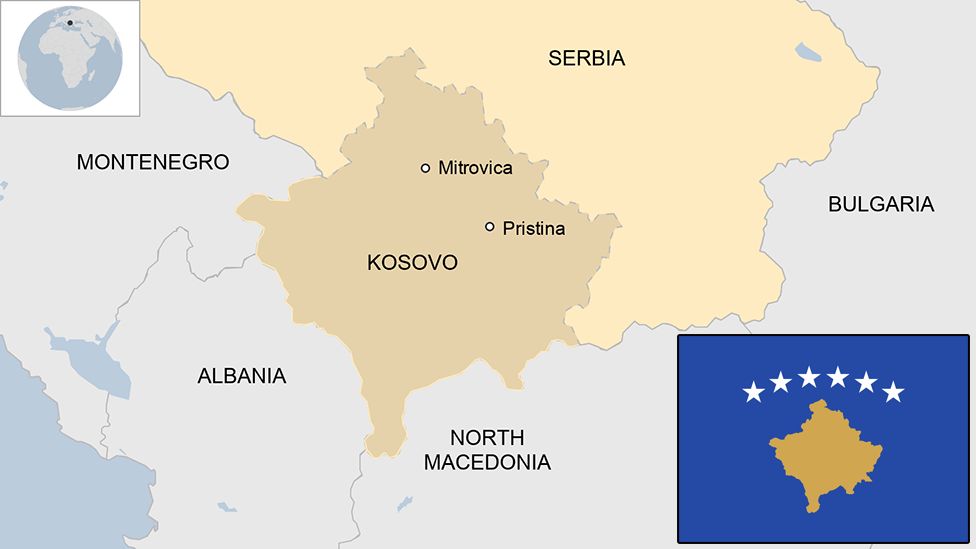Kosovo profile
- Published

Kosovo unilaterally declared independence from Serbia in February 2008, after years of strained relations between its Serb and mainly Albanian inhabitants.
It has been recognised by the United States and major European Union countries, but Serbia, backed by its powerful ally Russia, refuses to do so, as do most ethnic Serbs inside Kosovo.
After the break-up of the former Yugoslavia in the 1990s, Serbia responded to separatist pressure from Kosovo by launching a brutal crackdown on the territory's Albanian population, which was only brought to an end by Nato military intervention in 1999.
Until 2008 the province was administered by the UN. Reconciliation between the majority Albanians, most of whom support independence, and the Serb minority remains elusive.
Many of those living in majority Serb areas of the north refuse to recognise Kosovan institutions.
- Read more country profiles - Profiles by BBC Monitoring
REPUBLIC OF KOSOVO: FACTS
- Capital: Pristina
- Area: 10,887 sq km
- Major languages: Albanian, Serbian
- Population: 1.8 million
- Life expectancy: 68 years (men) 73 years (women)
LEADERS
President: Vjosa Osmani
In April 2021, parliament chose Speaker Vjosa Osmani as president to serve a five-year term.
This followed the resignation of President Hashim Thaci inNovember 2020 on learning that the Kosovo war crimes tribunal in The Hague had confirmed his indictment for war crimes.
Prime Minster: Albin Kurti
Albin Kurti of the centre-left Vetevendosje party took over as prime minister in March 2021.
Kurti, has said that "certain EU member states" are preventing visa liberation which would allow visa-free travel in the Schengen area.
Although he has been critical of the EU, Kurti says he is not bitter about it. He told the BBC that the EU had helped Kosovo a lot and the country looked forward to joining other member states one day, he said.
MEDIA
Television is the most popular medium. Most households have cable, meaning that domestic stations face strong competition from popular channels based in Albania.
Public broadcaster RTK was set up as an editorially independent service.
News websites are becoming key information sources, while the printed newspaper market is in decline.
TIMELINE
Some key dates in Kosovo's history:
1st Century AD - The Romans gain control of the area, populated by a people known as Dardani, who are thought to be either Illyrian or Thracian in origin.
6th Century - Slavs begin to settle in the area, which slips from Roman/Byzantine control and becomes a disputed border area.
12th Century - Serbia gains control of Kosovo, which goes on to become the heart of the Serbian empire. The period sees the building of many Serbian Orthodox churches and monasteries.
1389 - Epic Battle of Kosovo heralds 500 years of Turkish Ottoman rule. Over the centuries the religious and ethnic balance tips in favour of Muslims and Albanians.
1912 - Balkan Wars: Serbia regains control of Kosovo from the Turks.
1946 - Kosovo is absorbed into the Yugoslav federation.
1974 - Yugoslav constitution recognises the autonomous status of Kosovo, giving the province de facto self-government.
1981 - Troops suppress separatist rioting in the province.
1990 - Yugoslav President Slobodan Milosevic strips Kosovo of its autonomy and imposes Serbian administration on the territory, prompting Albanian protests.
1991 - Start of the violent break-up of Yugoslavia. Kosovar Albanians launch a passive resistance movement, but fail to secure independence.
1996 - The rebel Kosovo Liberation Army (KLA) steps up attacks on Serbian authorities in Kosovo. Their campaign grows, along with a Serbian crackdown.
1999 - After international efforts fail to stop the Kosovo conflict, Nato begins aerial bombardment of Serb targets. Yugoslav and Serbian forces respond with a campaign of ethnic cleansing against Kosovar Albanians, prompting an exodus. Following a peace agreement, Yugoslav and Serbian forces withdraw from Kosovo and a UN sponsored administration takes over.
2004 - Nineteen people are killed in the worst clashes between Serbs and ethnic Albanians since 1999. The violence starts in the divided town of Mitrovica.
2008 - Kosovo unilaterally declares independence.
2012 - Group of countries overseeing Kosovo since 2008 ends its supervisory role. Nato-led peacekeepers and EU rule-of-law monitors remain.
2013 - Kosovo and Serbia reach a landmark agreement on normalising relations that grants a high degree of autonomy to Serb-majority areas in northern, while both sides agree not to block each other's efforts to seek EU membership.
2022 - Heightened tensions amid Pristina's aim of making those in majority ethnic Serb areas swap Serbian-issued car number plates for Kosovan-issued ones.
2023 - Serbia and Kosovo agree to EU-mediated talks to normalise relations.
- Published28 June 2023
- Published22 May 2023
- Published22 August 2023
- Published8 January
- Published30 June 2023